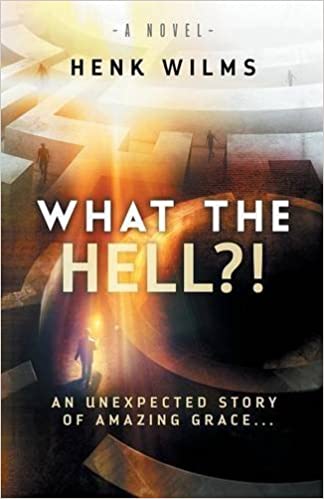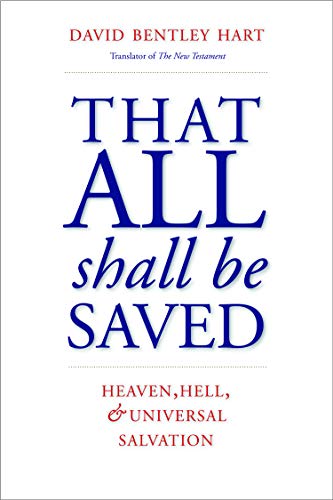
 What the Hell?! An Unexpected Story of Amazing Grace… by Henk Wilms will appeal to those few Christians who are interested in deep Bible study. But this book could also be of interest to a much wider audience because it could be transformational on a grand scale. Its appeal to me is primarily at a personal level as well as aligning with my desire for civil dialogue.
What the Hell?! An Unexpected Story of Amazing Grace… by Henk Wilms will appeal to those few Christians who are interested in deep Bible study. But this book could also be of interest to a much wider audience because it could be transformational on a grand scale. Its appeal to me is primarily at a personal level as well as aligning with my desire for civil dialogue.
THIS IS A STORY ABOUT a guy who struggles with the concept that a loving God could throw people into hell for all eternity, and who slowly finds some surprising answers from the Bible. The main purpose of this novel is to encourage a dialogue on a topic that has troubled millions of Christians and non-Christians alike, and on which there seems to be very little meaningful literature or discussion.
Henk Wilms is my friend. Our friendship is unlikely because he is a Christian conservative and I am a secular liberal. A good title for this book report would be Why on Earth?! An Unexpected Story of Amazing Friendship.
Decades ago we were spiritual brothers, members of the same church, with very similar worldviews. We met soon after Henk arrived in Calgary in 1980 and remained friends until he moved to Aberdeen, Scotland in 1998. I cannot recall a single point of conflict between us during that period.
At midlife I left the Christian faith while Henk’s faith matured and strengthened. Somehow our friendship survived, perhaps partly because of the geographical distance between us. From time to time Henk would return to Calgary to visit friends and family. We would get together at a local pub for some good beer and good fellowship. Those are pleasant memories.
One such visit occurred in 2011 and Henk shared news of a project that he was excited about. For some reason it interested me. Later that year he emailed me a draft of What the Hell?! which I read. Intuitively, it seemed to me that he was onto something. I encouraged Henk to complete his project and in 2016 his book was published.
Henk recognized my small contribution to his book in his Acknowledgments:
My friend John Stokdijk who read my initial efforts and encouraged me with his feedback.
After I retired in 2012, the email activity between us expanded greatly. It seemed that we no longer agreed on anything, not surprising since we now had very different worldviews. We explored our differences in depth and at times it was very hard work and frustrated both of us. Yet somehow we remained friends and our mutual respect grew.
In 2014 Henk and his wife Diane visited Pat and me here in Mexico. He had again gone to Calgary and decided to take a little side trip to visit us before returning to Aberdeen. It was an impressive confirmation of our friendship that he would go so far out of his way which I greatly appreciated.
The main character of What the Hell?! is Glenn and the story is about his struggle to learn what the Bible really says about hell. Glenn is deeply troubled by his inability to reconcile the idea of a loving God with the existence of an eternal hell. Jumping to the end of the story, Glenn concludes that a correct understanding of the Bible results in a teaching of a temporary redemptive hell rather than the mainstream Christian doctrine of an eternal hell as punishment. If all Christian churches and all Christian people were to come to the same conclusion as Glenn, one of the world's great religions, and its adherents, would be radically transformed!
What the Hell?! is a serious, comprehensive Bible study. Glenn examines all the possibilities and all the relevant scriptures. Glenn tries to be as open-minded as he possibly can be and avoid the trap of confirmation bias. Glenn dares to think for himself rather than meekly accepting the expertise of Biblical scholars or the authority of church leaders. Glenn is a character of integrity and determination worthy of respect.
It was interesting to see what the different views on hell were in Christianity, but it didn’t really tell Glenn which one he should believe. What was even more confusing was that all views seemed supported by the Bible. It all depended on what scriptures one preferred to emphasize.
There are several minor stories in What the Hell?! that are of more interest to me than its central message. Glenn is my friend Henk, as explained in the Preface, and Glenn has a friend named Brent who has a different personality. That character has several traits which reflect me. The dynamics between Glenn and Brent as they face significant differences while working to maintain an authentic friendship are familiar. For other readers, the book can be an exploration of what it means to be a true friend.
You’re my friend. I don’t like confrontations at the best of times, and especially not with my best friends.
I only have a different approach to the whole issue. And you don’t like it because I don’t accept that your deferential approach should be my approach? You think that having a different view about how to approach an issue is the same as having a confrontation?
Sometimes when friends get at it, sparks fly a bit. That makes life more interesting.
You’ve been a very good friend to me, Brent. If it wasn’t for you and your unique combination of support and reassurance that it is OK to have gut-turning questions, together with your gentle challenges to my thinking, I don’t know where I would be right now.
Glenn has a wife named Meghan and their relationship is another minor subplot. Sometimes she says things that could have come out of my mouth.
She didn’t really share his agonizing questions… He wasn’t sure where he would have been without her quiet acceptance of him and of his need to question things…
Glenn just looked at Meghan. He was fast running out of things to say or do, other than throwing up his hands and wondering if anyone would understand him, or understand that he was just asking questions, let alone that he had to ask these questions. Meghan was usually pretty good in understanding that he was wired up to ask questions, but if even she couldn’t understand what was going on, then he’d have no one to talk with or confide in… It was a very lonely place to be.
I am far more interested in the story of Henk Wilms and John Stokdijk than that of Glenn and Brent and Meghan. I am very concerned about the growing divisions in the world that are escalating towards extreme polarization. I am interested in bridging gaps that seem unbridgeable. Henk and I are evidence that a Christian conservative and a secular liberal can be friends and that too is an important story.
Too often religious and secular people reduce each other to caricatures that are easy to mock. In my opinion, the efforts of some secular thought leaders who would like to rid society of every last trace of religion are misguided at best. That would mean ridding society of Henk Wilms, a rational, reasonable, loving human being, and that thought is intolerable to me. I aspire to live in a society that is truly diverse and pluralistic. I aspire to live in a society in which it is acceptable to be openly gay or openly Christian. Why should anyone need to hide any aspect of their authentic selves?
My appreciation for Glenn, and Henk, has an unexpected twist that slowly emerged long after I had read the first draft in 2011.
I left home at age eighteen for several reasons, one of which was to get far away from my father. Three thousand miles seemed to be about the right distance and I moved from Nova Scotia to Alberta. We never reconciled although we did have a wonderful, healing visit during the last week of his life in 2006.
As I read What the Hell?! in 2017 I kept thinking about my father. Glenn is stubborn, opinionated, intense, blunt, direct, forceful, sometimes arrogant, sometimes obsessive, sometimes dismissive, sometimes insensitive, but all things considered, a good man. My father was opinionated, intense, blunt, direct, forceful, sometimes arrogant, sometimes obsessive, sometimes dismissive, sometimes insensitive, but all things considered, a good man. Glenn is easy to respect but sometimes difficult to like and I would say the same about my father. Reading about Glenn and having Henk as a friend have helped me take one more small step in my journey away from my childhood hurts.
Although Glenn is mostly a realist, he has an idealism that can inspire even a secular liberal. As Glenn fully embraces his understanding of a temporary, redemptive hell, he realizes how liberating this can be, how much unnecessary suffering this could eliminate.
My thoughts now turn to my 97 year old mother. She has three sons, one of whom she believes will burn in hell for all eternity. She once told me that this was the greatest burden that she carries and there was nothing I could do to lessen her pain. I would love to give her a copy of Henk’s book but she is too near the end of her life to change a belief she has held her whole life. It is too late for my mother but it is not too late for many other Christians.
I can’t help but think how your understanding of hell would be an incredible relief for an awful lot of people, millions probably…Their whole life would be changed beyond recognition if they knew that Jesus loves their kids or grandkids just as much as He ever did, and is still confidently working towards bringing them into His family!
My mother would wholeheartedly agree with Glenn:
No other religion has a message of grace and forgiveness and redemption and healing like Christianity does.
As a secular liberal, I share Glenn’s desire for a better relationship between the religious and nonreligious factions of society believing, as I do, that we can move beyond tolerance and achieve a measure of mutual respect.
Glenn also imagined that without an eternal hell to condemn people with, the whole attitude of Christians towards non-Christians would be noticeably less judgmental and vindictive.
Thank you Glenn. Thank you Brent. Thank you Henk.
I wrote the above review in 2017.
I am a regular reader of essays published on the Aeon website. On January 8, 2018 an essay was published which caught my eye: Everything you know about the Gospel of Paul is likely wrong by David Bentley Hart. Had I not read What the Hell?!, this article would not have sparked my interest.
 In 2019 Hart published That All Shall Be Saved: Heaven, Hell, and Universal Salvation, described on amazon.com as follows:
In 2019 Hart published That All Shall Be Saved: Heaven, Hell, and Universal Salvation, described on amazon.com as follows:
A stunning reexamination of one of the essential tenets of Christian belief from one of the most provocative and admired writers on religion today
The great fourth century church father Basil of Caesarea once observed that, in his time, most Christians believed that hell was not everlasting, and that all would eventually attain salvation. But today, this view is no longer prevalent within Christian communities.
In this momentous book, David Bentley Hart makes the case that nearly two millennia of dogmatic tradition have misled readers on the crucial matter of universal salvation. On the basis of the earliest Christian writings, theological tradition, scripture, and logic, Hart argues that if God is the good creator of all, he is the savior of all, without fail. And if he is not the savior of all, the Kingdom is only a dream, and creation something considerably worse than a nightmare. But it is not so. There is no such thing as eternal damnation; all will be saved. With great rhetorical power, wit, and emotional range, Hart offers a new perspective on one of Christianity’s most important themes.